Table of Contents
Introduction
This article explores the importance of proper oral hygiene for children. Poor oral hygiene habits can lead to long-term dental health problems.
We will discuss the repercussions of not brushing and flossing in addition to the benefits of developing healthy habits at an early age.
We’ll provide tips and ideas on how to encourage children to develop good dental habits, as well as how to make sure they are brushing and flossing correctly.
We will also discuss the role of diet and nutrition in maintaining good oral hygiene.
Take the first step to a better Oral health!
Get tips on Oral health and discover ways to improve your Dental health. Sign up today
HOW TO PREVENT EARLY CHILDHOOD CARIES IN YOUR BABY ? A CARIES GUIDE TO PARENTS
The Importance of Oral Hygiene for Kids
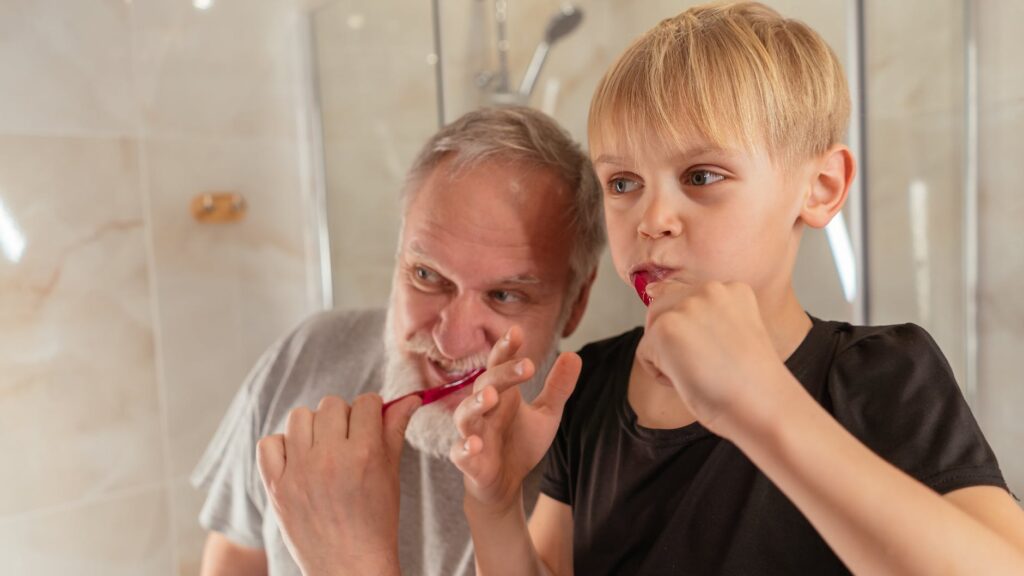
Good oral hygiene is essential for kids, just like adults, to maintain proper dental health and prevent tooth decay or gum infection.
Not only does good oral hygiene help keep teeth clean and healthy, but it also plays an important role in overall physical health and development
Brushing teeth is especially important for kids since they can often be more prone to caries than adults due to their diet habits and lack of understanding about brushing correctly.
Teaching your child, how often they need to brush (as determined by dentists and demonstrating how they are supposed to properly brush their teeth every morning/night) helps build healthy habits right from the beginning.
It’s recommended by dental professionals that Kids aged between 6 months to 2 years should brush at least twice daily using soft bristled type brushes coated with kid-appropriate flavored and fluoridated paste for two to three minutes each time.
However, parents may wish to add supervised rinsing after meals throughout that timespan.
Failure in maintaining proper oral health during childhood could lead to numerous complications at later stages such as increased susceptibility towards plaque /tartar build-up, receding gums & root scaling caused by calculus deposits.
It results in a drastic loss of adult set teeth even before reaching adulthood which in turn will lower your child’s confidence and social activities.
Furthermore, cropping up cavities & associated bacterial infections worsen invariably leading to risks over health issues pertaining to both short term/long term basis.
Therefore, it is of utmost importance to impart elementary knowledge on maintaining good oral hygiene in young minds.
Does Good Oral Hygiene Apply to Children?
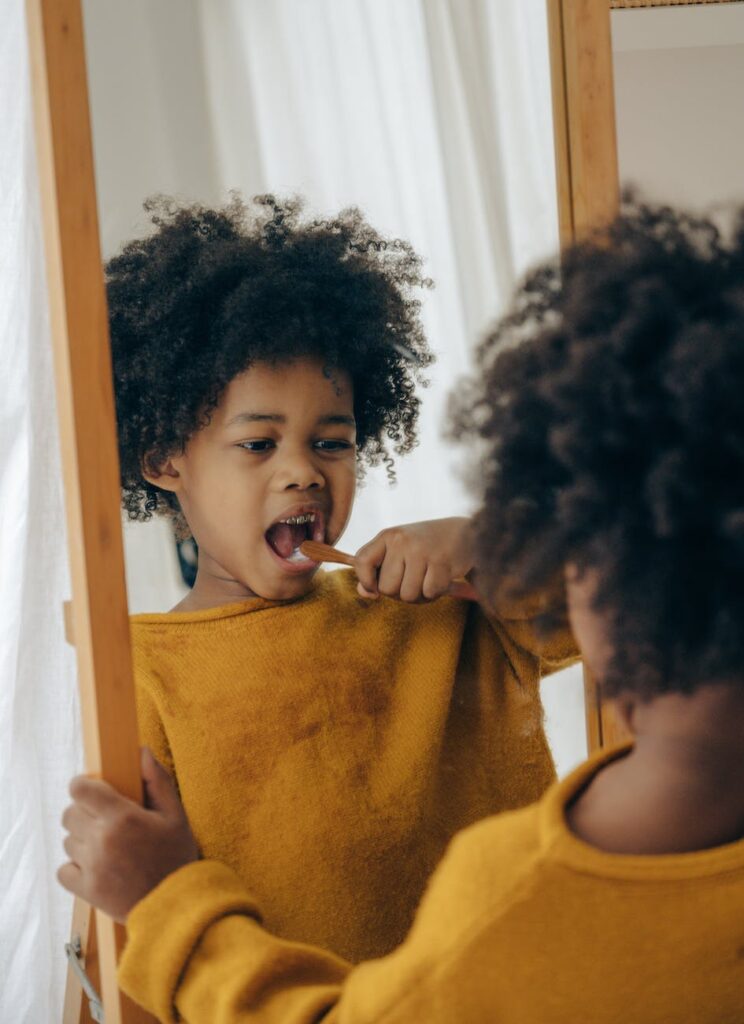
Children are often overlooked when considering oral hygiene, but it is just as important for them as it is for adults!
When children begin to cut their first teeth at around six months of age, parents should start teaching them the basics of good oral hygiene.
Brushing with a child-specific toothbrush and paste should be established as a habit for the child by the time he reaches his second birthday.
Parents can help encourage and oversee their children’s brushing habits from an early age. This includes making sure
- They brush in small circles or back-and-forth motions (depending on what dentists recommend for two minutes or more).
- Along with brushing, they should also see to it that their children clean their tongues regularly.
- Supervising young ones to make sure they do not swallow any extra toothpaste.
- parents should also focus on how often kids brush their teeth according to dentists’ recommendations. Generally, at least twice daily after breakfast and before bedtime is recommended.
- Proper flossing techniques should be taught once this skill has been acquired.
- Children’s toothbrushes come in various sizes that fit better inside the mouth. so, choosing the appropriate size based on your child’s age will make brushing easier for them. On top of that, fluoride-based kid-specific toothpaste is available which has lower acidity levels compared with normal pastes used by adults.
- Pediatric toothpaste usually has bubble-gum flavorings that can encourage children into making this habit fun!
The use of child-specific products such as flavored fluoride toothpaste and kid-friendly manual brushes makes oral hygiene fun while still being effective in cleaning between teeth!
Parents need to ensure that regular dental check-ups occur along with full management of oral health. Any concerns raised about one’s bite alignment/teeth growth abnormalities etc should be brought to the notice of your dentist.
Any cavities should be treated promptly so that they do not worsen the child’s oral hygiene.
Finally, diet modifications like reducing sugar intake from sugary snacks & drinks can prevent cavities from forming & damaging weak enamel.
FLUORIDE TOOTHPASTE | WHEN TO USE AND WHEN TO AVOID
Is Brushing Teeth Important for Kids?
Yes! Brushing teeth helps remove plaque build-up on the surface of each tooth, which can lead to cavities later down the line.
Regular cleaning with fluoride toothpaste also helps strengthen enamel which shields against acidic foods and bacteria that enter your mouth.
So, it’s important for parents to teach their children about regular brushing before any damage takes place. Starting this habit early will most likely stick with them by adulthood!
At what age should kids start practicing oral hygiene?
Cleaning the oral cavity should become a regular practice from birth. As the infant drinks milk in the initial days, cleaning the gums with a soft cotton cloth after every drink is a good habit.
The American Academy of Paediatric Dentistry recommends parents begin cleaning their baby’s gums soon after birth by rubbing them gently with a soft washcloth or gauze pad dampened with water.
As soon as your baby’s first tooth appears it is time you introduce a small amount of fluoridated toothpaste (about the size of a grain of rice onto the bristles (Finger brush) & start teaching your child how to brush his/her own teeth properly (under adult supervision).
It’s best practice to introduce an infant or toddler between the ages of one and two years old to start learning how to brush their own teeth.
Regular dental visits should be made mandatory every 6 months until your child meets adolescence.
Also read:
TOOTHPASTE FOR KIDS. DON’T DO THIS WHILE BRUSHING YOUR KID’S TEETH
How Can Parents Help Their Child Maintain Good Oral Hygiene?
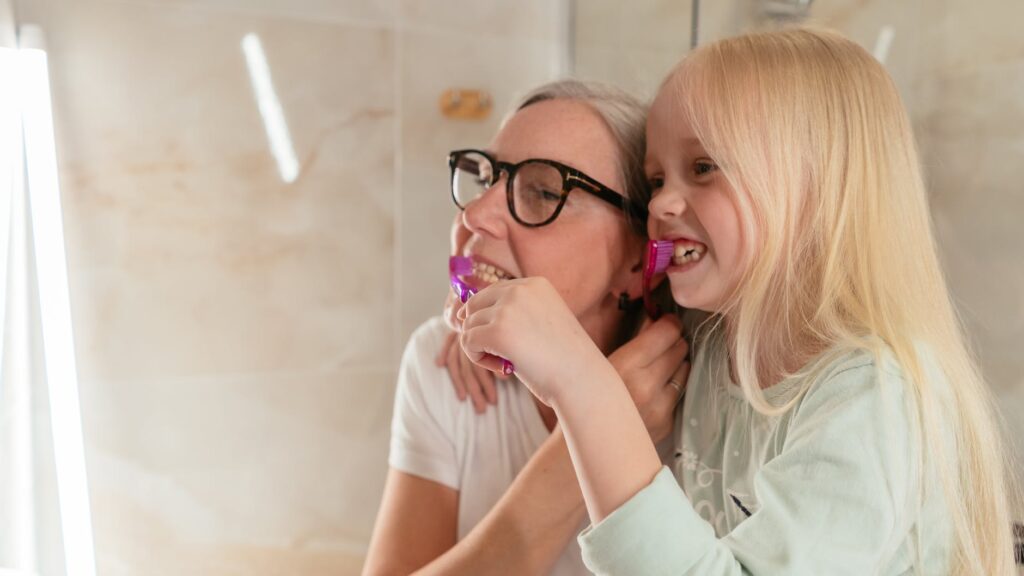
It could not be more important for young children to maintain regular brushing habits to develop and keep healthy teeth. Poor oral hygiene can lead to a variety of dental problems such as tooth decay, gum disease, and even blocked airways. These issues are preventable when the right measures are taken up early.
Just like adults, kids should brush their teeth at least twice a day – once in the morning before breakfast and once at night before bedtime – using an appropriate fluoride-containing toothpaste.
Brushing helps remove bacteria that form plaque which leads to cavities and other dental health issues if left unchecked.
Kids should also use floss or interdental brushes daily along with brushing to eliminate food particles from hard-to-reach areas between teeth.
One way parents can make sure their child gets into good habits is by making sure they have access to suitable tools – this includes having both kid-sized toothbrushes (with soft bristles) and appropriate pediatric toothpaste.
Parents should encourage regular brushing at home – setting certain times during each day, dedicated solely to proper mouth care. They should always supervise their child’s brushing activity until their child is old enough to need surveillance.
Putting gentle reminders in the form of colorful posters around the bedroom & wall signs etc, in your child’s bedroom, will help them to get motivated to maintain regular oral hygiene.
Moreover, considering your child’s choice in selecting a toothpaste and brush will attract them to brushing, as they like what they buy. Pediatric toothbrushes and pastes come in various shapes and taste respectively. They make brushing a joyful activity.
Are There Any Risks to Oral Health If Not Practiced in Childhood?
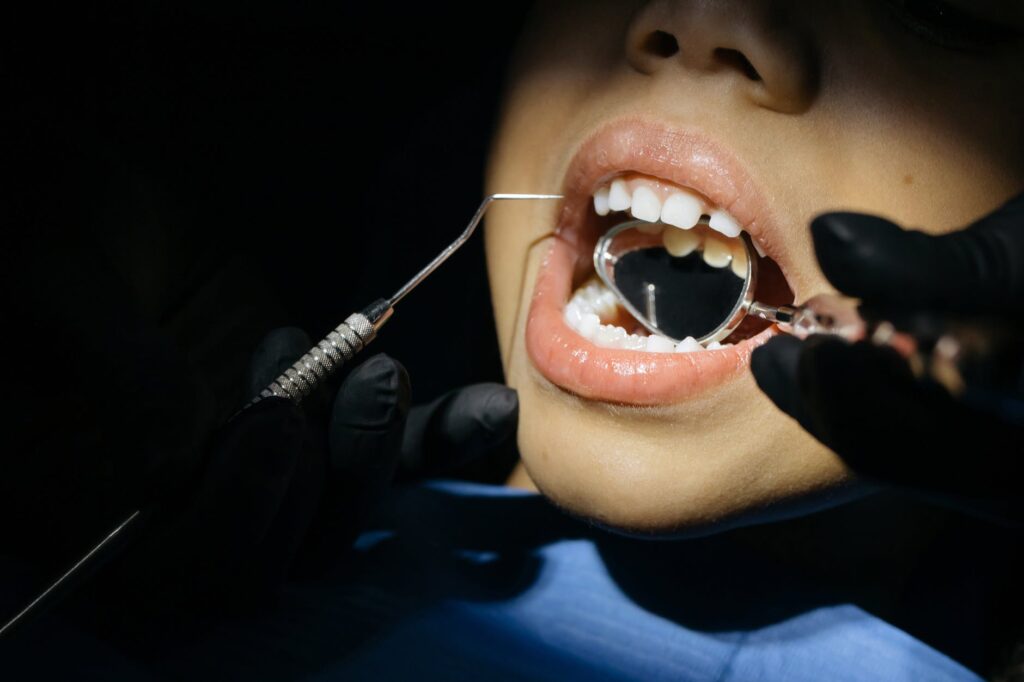
Almost 90% percent of adult cavities arise during childhood due to doctoring unhealthy practices such as neglected brushing and snacking between meals.
Not practicing adequate oral hygiene starting from childhood may lead to serious dental problems later in life, such as
- Cavity development due to lack of removing food debris between spaces
- Periodontal Disease – Gum inflammation caused bacterial infections
- Tooth Decay
- Tooth discoloration
- Without proper care, germs are allowed access to delicate tissue which leads to costly restorations later in life.
The biggest advantage of early brushing is preventing these issues rather than dealing with problems once developed.
Therefore, introducing daily brushing routines is necessary for preventing adult dental problems.
Conclusion
Good oral hygiene habits that are established in childhood can last a lifetime. Parents must teach their children the importance of brushing and flossing regularly.
Choosing age-appropriate toothbrushes, toothpaste, and other dental care products is important for parents.
It is also vital to emphasize the importance of good oral hygiene as early as possible in kids and there is no room for compromise in this regard.
- Is oral hygiene compulsory for kids? - January 13, 2023
- How to Choose the Best Dental Crown for Your Smile? - December 8, 2022
- Who needs antibiotics before dental work? What is antibiotic prophylaxis? - October 31, 2022
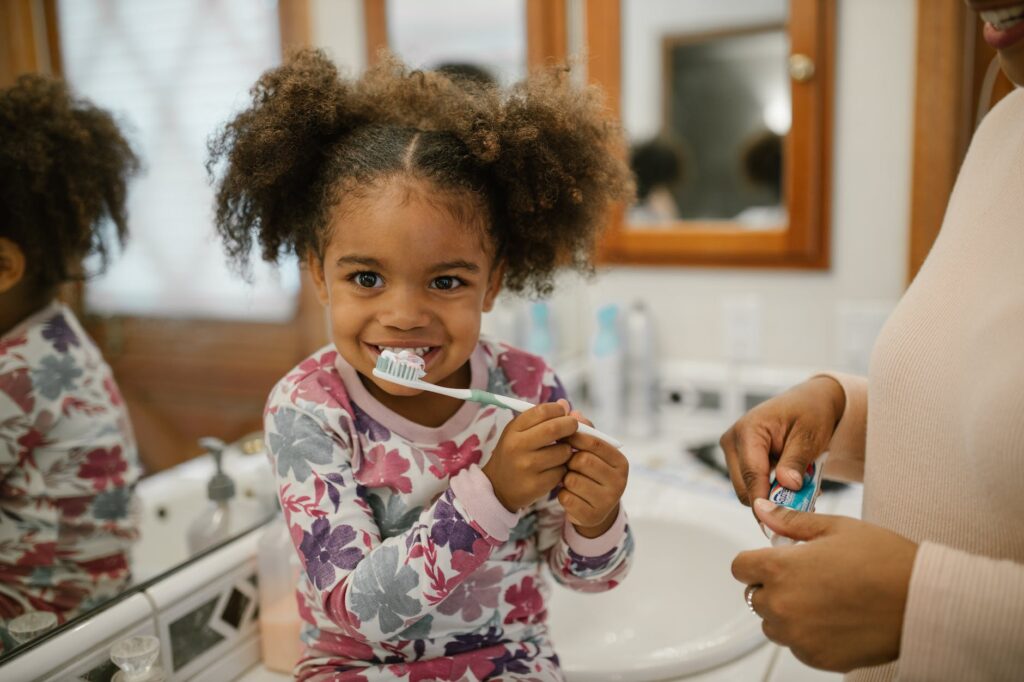
Pingback: 7 Effective Teeth Cleaning Tips For A Brighter Smile At Home | Dentadigest